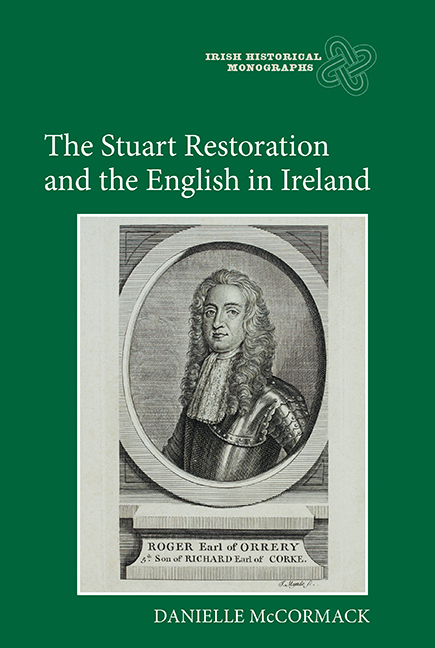Book contents
- Frontmatter
- Contents
- Miscellaneous Frontmatter
- Acknowledgements
- List of abbreviations and conventions
- Introduction
- 1 The political and mental map of 1660s Ireland
- 2 Stuart restoration and the beginnings of Protestant discontent
- 3 Roger Boyle, earl of Orrery, and the evolution of English Protestant identity in Ireland
- 4 Moral and rhetorical challenges to Protestant power
- 5 Charles II and his ministers in Ireland
- 6 The court of claims, popery and Stuart authority
- Conclusion
- Bibliography
- Index
- Frontmatter
- Contents
- Miscellaneous Frontmatter
- Acknowledgements
- List of abbreviations and conventions
- Introduction
- 1 The political and mental map of 1660s Ireland
- 2 Stuart restoration and the beginnings of Protestant discontent
- 3 Roger Boyle, earl of Orrery, and the evolution of English Protestant identity in Ireland
- 4 Moral and rhetorical challenges to Protestant power
- 5 Charles II and his ministers in Ireland
- 6 The court of claims, popery and Stuart authority
- Conclusion
- Bibliography
- Index
Summary
By 1665 Ireland had been settled in favour of the Protestants of Ireland, as the doors of the court of claims were closed to Catholics and the Cromwellian land transfer of the 1650s was essentially allowed to stand. In 1667, Clarendon was sent into exile by Charles II, and two years later both Ormond and Orrery suffered political marginalisation, largely due to the efforts they each had expended on undermining the other. The downfall of Clarendon marked an end to the first phase of the restoration regime, as Charles II shifted his political orientation and looked increasingly to an alliance with France. Ireland's fate was determined in the first phase of the regime, and was the consequence of the interaction of the political, military and economic status quo with the royal agenda and efforts of domestic interest groups to shape the settlement.
The status quo in 1660 was heavily weighted in favour of Protestants, who united temporarily in an attempt to ensure that gains of the 1650s were maintained. Their efforts took shape at the Irish Convention in February 1660, which established the guiding principles on which Protestant commissioners should treat with Charles. The position of the king was weak, as he was dependent for support in Ireland on the Protestants who had declared for him. He also made the careless error of accepting Protestant representations that there was sufficient land to satisfy both the incumbents and Catholics who were innocent of rebellion. This mistake would seriously constrain the crown. It would mean that the king was inhibited in the exercise of royal favour on behalf of his servants and in the demonstration of royal justice for those who were innocent of rebellion.
For Protestants the crucial matter was maintenance of the Cromwellian settlement, while the king and his ministers aimed at the creation of security for the regime in Ireland through the establishment of a class of landholders loyal to the monarchy. In this respect, the possibility of alliance between the monarchy and the Catholic interest presented itself. This was predictable. Catholics assumed upon royal favour for their position, in the light of the 1649 alliance between royalists and the Confederation of Kilkenny. Furthermore many Catholics had gone into exile with the House of Stuart.
- Type
- Chapter
- Information
- The Stuart Restoration and the English in Ireland , pp. 164 - 168Publisher: Boydell & BrewerPrint publication year: 2016

